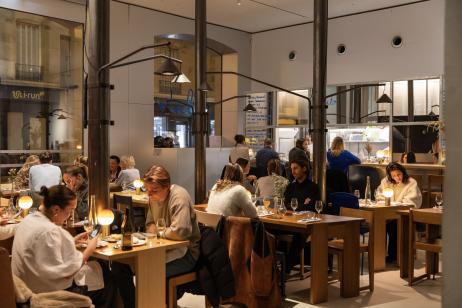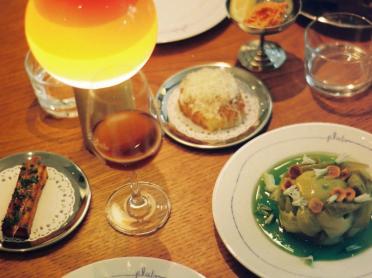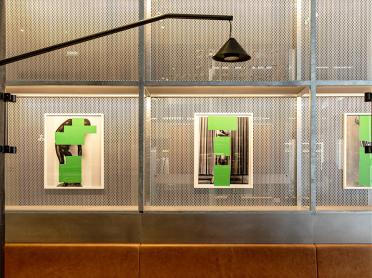
Café-restaurant pluto
Surrounded by artists' works, the pluto café-restaurant is a place for culinary experimentation in tune with the seasons, from lunch to dinner!
The idea originated with three childhood friends: Adrien Ducousso, Pierre-Louis Hirel and chef Thomas Coupeau : they turned pluto into a place of life and joy, where Coupeau's gastronomic offerings resonate with the effervescent creativity celebrated at the Fondation. The restaurant offers mischievous and delicious dishes that reflect the chef's inventiveness, celebrating flavour and curiosity as much as gourmandise.
Nestled in the unique architecture designed by Rem Koolhaas at Lafayette Anticipations, in the heart of the Marais, pluto is the new gastronomic landmark of the Parisian and international cultural scene. In this exceptional setting, in the soeil of the Fondation's hidden courtyard, or on its terrace on the quiet and discreet rue du Plâtre, you can meet artists passing through Paris, musicians at aftershows, local gallery owners and fashion lovers...
At lunchtime, the menu is relaxed and comforting; in the afternoon, you can stroll around, make appointments and enjoy coffee and pastries, followed by a visit to an exhibition or reading a magazine at the Librairie de la Fondation, just a few metres away; and in the evening, dine in iconoclastic bar and bistro mode.
In a spirit of Zen, this café-restaurant is designed by the Hugo Haas studio, with bespoke wooden furniture and elegant chairs by Danish brand Frama.
Pluto can also be transformed to accompany concerts, parties, artists' dinners and a host of Lafayette Anticipations events.

Opening hours
Monday Closed
Tuesday Closed
Wednesday 12pm - 11:30pm
Thursday 12pm - 11:30pm
Friday 12pm - 11:30pm
Saturday 12pm - 11:30pm
Sunday 12pm - 5pm
Services
Lunch: 12:30pm - 3pm
Coffee / drinks: 3pm - 7pm
Dinner: 7:30pm - midnight (last food order at 11:30pm)

Currently on view
In Shahryar Nashat’s New Fit for the Old Guard (2013), green rectangular shapes take over the artistic bodies captured in black-and-white photographic prints. In the photographs, these sculptures from antiquity are partially hidden by green rectangles. In the hands of Nashat, different artistic forms resonate to form a new work in which the human body plays the main role. The artist questions the modes of representation and codes used to show art objects in museums, a process that is expressed through a geometric hybridization passing through the forms added to the photographed works. Paradoxically, the green rectangles cover an important part of the work while suddenly highlighting other elements.
Text written by Julie Robin as part of the partnership between the École du Louvre and Lafayette Anticipations – Fonds de dotation Famille Moulin.